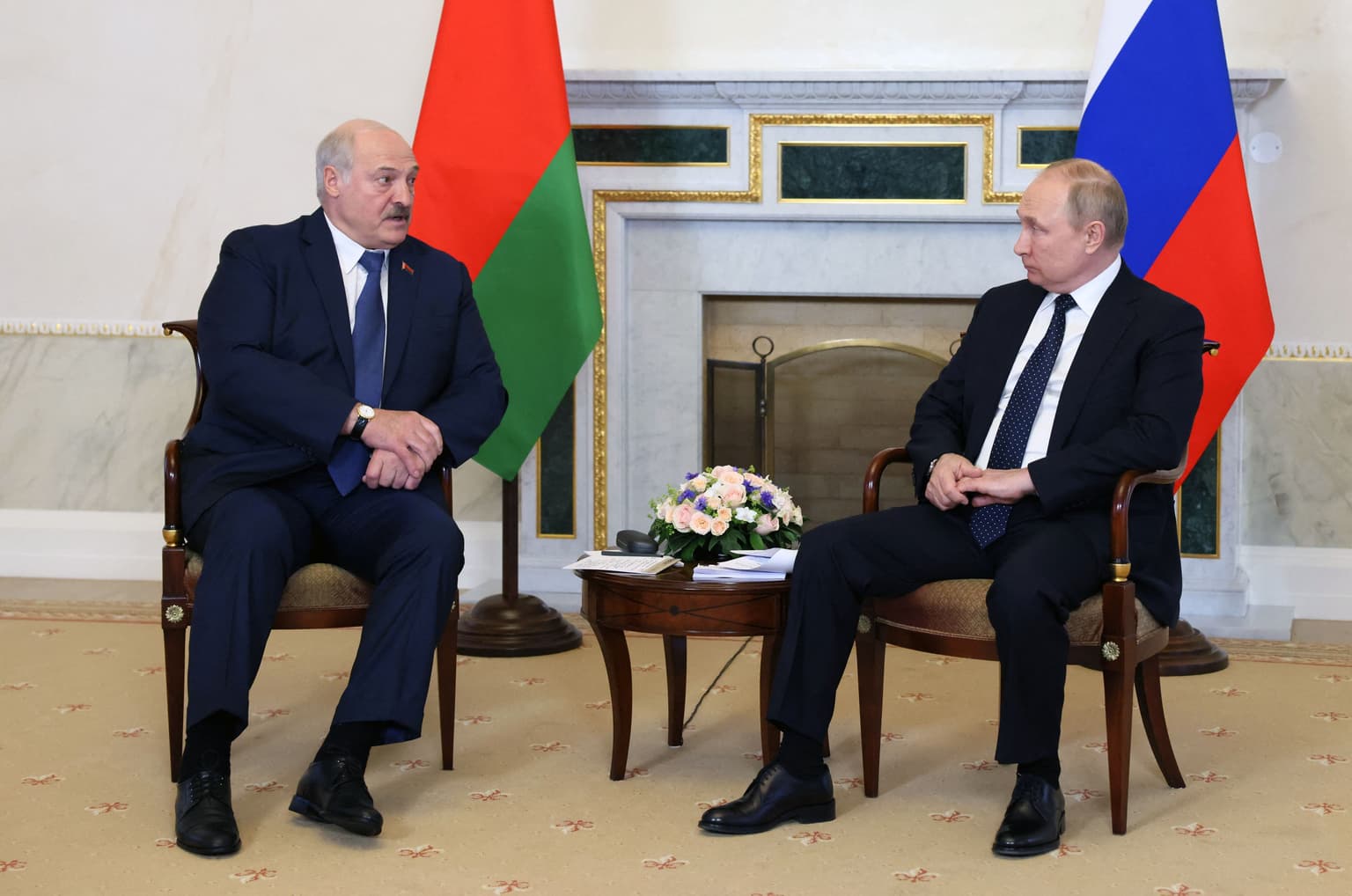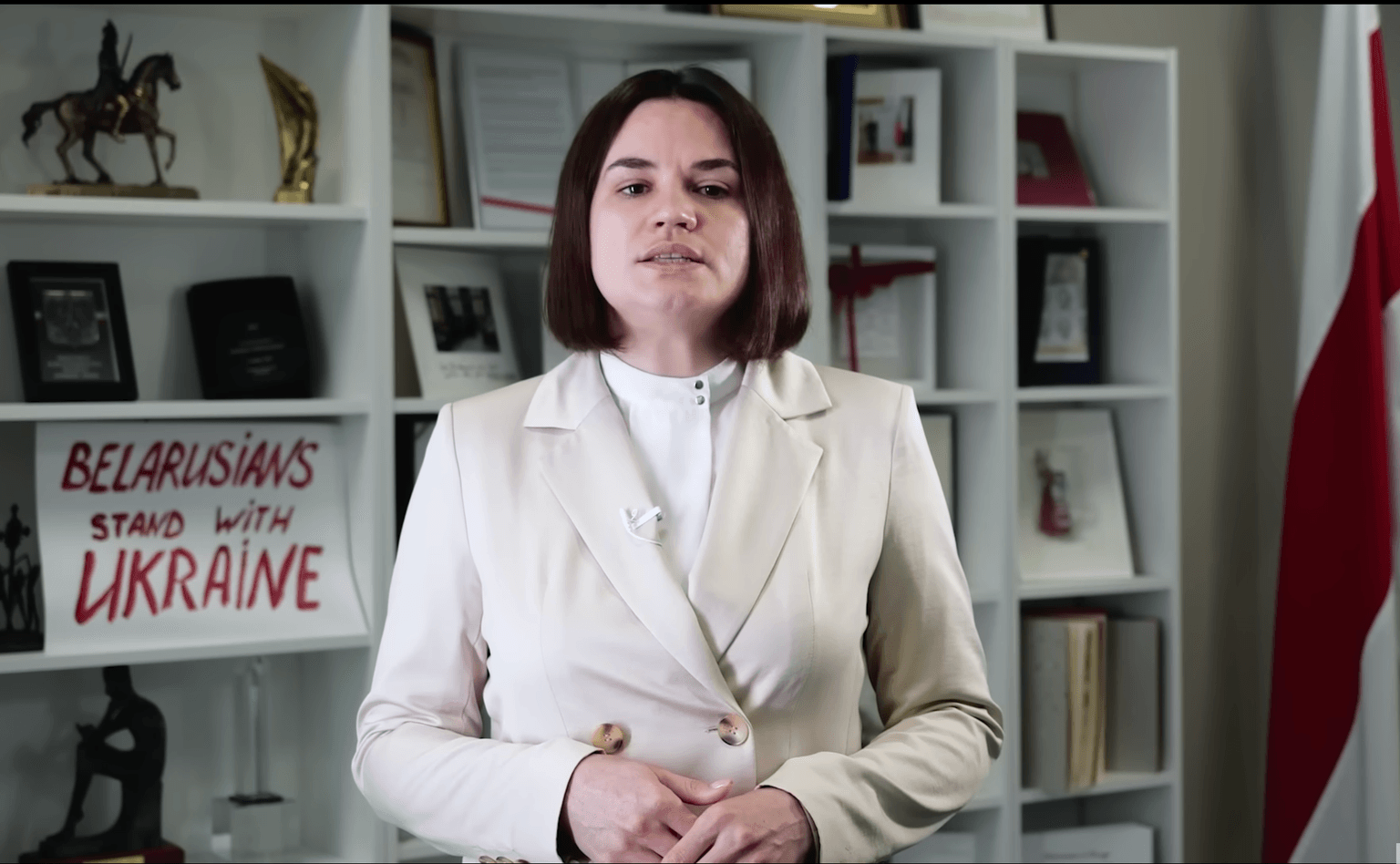Belarus Weekly: Lukashenko meets with Putin for sixth time this year, taunts world with threat of nuclear proliferation.

The Kyiv Independent is continuing to provide readers with a weekly roundup to help explain current events in Belarus. To receive the Belarus Weekly newsletter subscribe via this LINK.
Belarusian dictator Alexander Lukashenko met with his Russian counterpart Vladimir Putin for the sixth time this year, taunting the world with the threat of nuclear proliferation.
Russia resumed launching missiles into Ukraine from Belarusian territory, likely in an attempt to drag Belarus into directly joining Russia’s full-scale war against Ukraine.
The increasing risk of direct involvement by Belarus prompted President Volodymyr Zelensky to issue a statement to the Belarusian people, urging them to oppose the war.
Meanwhile, the regard for human rights in Belarus is deteriorating further. Human rights watchdog Viasna published a report alleging the torture of detainees in detention facilities across the country.
In another example of the arbitrary use of the legal system in Belarus, a high-ranking official in Belarus’ Ministry of Internal Affairs, shot a teenager for a minor infraction. Charges have been brought against the teenager.
Bureaucratic hurdles in Ukraine are forcing many Belarusians seeking refuge from their country to leave or face deportation to Belarus, where they may potentially face politically-motivated persecution.
Russia resumes missile attacks on Ukraine from Belarus
Russian airstrikes were conducted from Belarusian territory this week for the first time since April.
Overnight on June 25, six Russian Tu-22M3 long-range bombers took off from Shaikova airport in Kaluga Oblast, Russia, entered Belarusian airspace, and fired 12 Kh-22 cruise missiles near Mazyr, a southeastern Belarusian town just 60 kilometers north of the Ukrainian border.
According to Ukrainian authorities, the missiles struck Kyiv, Chernihiv, and Sumy oblasts.
Ukrainian intelligence notes that the shelling from Belarus may be an “attempt by the Kremlin to draw Belarus into the war with Ukraine, as a direct participant.”
Mazyr case
According to Ukraine’s Defense Ministry’s Intelligence Directorate, Russia has allegedly sent mercenaries to conduct attacks on residential buildings and civilian infrastructure in Mazyr, which they may falsely attribute to Ukraine, in order to draw Belarus into the war.
On June 17, a week prior to the allegations made by Ukraine’s intelligence, Lukashenko said in a speech that Belarus will conduct airstrikes on Kyiv should the Ukrainian army shell the Mazyr Oil Refinery.
Belarusian monitoring group Belaruski Hayun says it has not observed such preparations and that there has not been any indication in local media of the withdrawal of the local military from Mazyr.
Putin, Lukashenko meet to discuss nuclear armament
At a meeting between Putin and Lukashenko on June 25 in Saint Petersburg, the Belarusian dictator expressed concern about the training exercises undertaken by U.S. and NATO aircraft, which he claims “carry nuclear warheads.”
Putin pledged to deliver Iskander nuclear-capable short-range ballistic missile systems to Belarus in the coming months, as well as to provide Sukhoi Su-25 aircraft able to carry nuclear weapons.
Kremlin spokesperson Vladimir Peskov later downplayed this statement, saying that Russia has not promised to provide Belarus with a nuclear arsenal, just carriers capable of holding conventional and nuclear missiles.
Meetings between Putin and Lukashenko in 2022 have occurred monthly. Lukashenko left suddenly for Russia for informal talks on June 23, despite the next forum planned for June 30 in Hrodna, a Belarus regional capital on the Polish border,
Belarusian political analyst and historian Valer Karbalevich suggests that the sudden meeting and discussion of nuclear capabilities is likely a response to Lithuania’s decision to block the transit of a large number of goods by rail to and from Russia’s Kaliningrad Oblast exclave.
According to Karbalevich, Putin is attempting to raise the stakes for European politicians supporting Ukraine, as well as to pull Belarus to directly participate in Russia’s war. He argues that the active participation of Belarus would be critical for success in the case of a Russian offensive in the Suwalki Gap – the 100-kilometer strip at the Poland-Lithuania border.
Konrad Muzyka, the president of military consulting group Rochan Consulting, suggests that the potential delivery of Iskanders to Belarus is not a new development, as they were already operated by Russian troops on Belarusian territory. Yet, he adds that in order to store Iskanders capable of bearing nuclear load, Belarus must first develop suitable storage facilities.
Russia to increase military presence, aviation in Belarus
Ukraine’s Defense Ministry stated on June 23 that Belarus is fixing military equipment to eventually transfer it to Russian forces at the frontlines.
According to the Deputy Chief of Ukraine’s General Staff Oleksiy Hromov, new military infrastructure is observed at Zyabrovka air base near Homiel, on Ukraine’s border.
Ukraine’s intelligence also stated on June 26 that the Kremlin plans to increase the number of Russian military aircraft in the region, as well as to conduct joint airspace patrols.
On June 27, Ukraine’s General Staff reported that airstrikes and missile attacks from Belarus are expected to continue, noting that Ukraine is closely observing the movements of Belarus’ military.
Belarusian military drills simulate oil depot bombing, detention of saboteurs
As of June 27, Belarus’ military has conducted military drills simulating the bombing of an oil depot with drones, the detention of saboteurs, the liberation of hostages, and the transportation of hazardous radioactive substances.
Under the supervision of Belarus’ Ministry of Internal Affairs and the Ministry of Emergency Situations, the drills will supplement those that started on June 24 and engage the newly-established territorial defense units.
President Zelensky urges Belarusians to resist war, Tsikhanouskaya responds
Amid the increase of Russian missile attacks from Belarus, President Volodymyr Zelensky addressed the people of Belarus on June 26, saying that the risk of their country being dragged into the war is greater than ever.
“The Kremlin has already decided everything for you, your lives are worthless to them. But you are not slaves or cannon fodder, you don’t have to die,” Zelensky said. “You can’t let anyone decide what awaits you next.”
Read More: Discontent grows between Kyiv, Belarus opposition as Russia drags Belarus further into war
On June 28, Belarusian opposition leader Sviatlana Tsikhanouskaya issued a response to Zelensky’s address, in which she emphasized that both Ukrainians and Belarusians understand the role Lukashenko plays in Russia’s war against Ukraine.
Tsikhanouskaya also highlighted the existence of Belarusian movements in support of Ukraine and that animosity between the Belarusian and Ukrainian peoples will only serve to advance the Kremlin’s goals.

Belarusian opposition leader Sviatlana Tsikhanouskaya addresses President Volodymyr Zelensky on June 28, 2022. (Screenshot)
Human rights watchdog reports torture in almost every detention facility in Belarus
Belarusian human rights watchdog Viasna published three reports on June 24 focused on politically-motivated criminal prosecutions, politically-motivated administrative processes, and detention facilities in Belarus.
According to Pavel Sapelka, one of Viasna’s lawyers, the three reports are united by one theme: torture and inhumane treatment as an “integral feature” of detention facilities in Belarus.
Viasna recognizes 1,214 individuals as political prisoners in Belarus. The watchdog also has data on over 2,900 individuals that have been prosecuted since the 2020 Belarusian presidential election.
According to the watchdog, every person detained in Belarus underwent some form of torture or mistreatment, including, but not limited to, beatings, sexual violence, overcrowded cells, isolation, psychological abuse, and lack of regard for basic hygiene.
Top Belarusian official shoots teenager in dispute, charges filed against teen
On June 21, Andrei Parshin, the chief of one of the Belarusian Interior Ministry’s departments, engaged in a dispute with several teenagers, the youngest of which was 11 years old, near the entrance of his home in Minsk.
Parshin asked them to leave the building’s premises, to which one of the teenagers, Yauhen, 16, responded by saying that they were “free to choose a bench.” Parshin reportedly pushed Yauhen and, upon receiving a physical response, shot the boy in the leg with a gun.
According to Belarus’ Interior Ministry, Parshin had been on vacation on the day of the altercation.
BYPOL, an association of exiled former Belarusian law enforcement officials, says that carrying a gun off-duty is not permitted, although there may have been undisclosed permission granted. The group also maintains that Belarusian law demands that the use of a firearm be the last resort preceded by proper warnings, as well as not occur in public spaces with minors present.
Witnesses maintain that no warnings were issued, the group consisted of minors, and Parshin likely initiated the altercation. Following the incident, Yauhen was hospitalized and is now facing criminal charges for “hooliganism.”
Parshin is the former chief of Belarus’ General Directorate for Combating Organized Crime and Corruption, infamous for politically motivated detentions.
Belarusian human rights activist detained in Kyiv amid ongoing hurdles for Belarusians in Ukraine
Anisia Kazliuk, a Belarusian human rights activist, Forbes 30 Under 30 nominee, and volunteer in Ukraine, was detained in Kyiv on June 24 for residing in Ukraine over her legal stay.
On Feb. 23, she reportedly received an extension for her stay in Ukraine and was about to file for a residence permit. However, since the start of Russia’s full-scale war, Ukraine has terminated the issuing of residence permits. Should she have been forced to return, Kazliuk would have faced potential political persecution in Belarus.
With the assistance of activists and Sviatlana Tikhanouskaya's office in Ukraine, she managed to avoid deportation back to Belarus.
In 2021 alone, Ukraine issued 4,300 residence permits to Belarusians, many of whom fled the country to avoid persecution or to help Ukraine defend itself from Russian aggression. However, the possibility for them to extend their legal stay in Ukraine is shrinking.
While Ukraine’s migration department announced the resumption of residence services in May, many Belarusian nationals have been refused renewals. Ukrainian authorities have reportedly requested that they “prove their intent is not to harm Ukraine,” despite there being no legal requirements for the provision of such documents.
According to Palina Brodik, the coordinator of the Kyiv-based human rights group Free Belarus Center, there is no clear system for the processing of residence permits for Belarusian nationals. Brodik says that, while sometimes a letter vouching for an individual from a Ukrainian volunteer organization is sufficient, other times an entire stack of documents is deemed insufficient.
Ukraine’s migration department reportedly suggests that Belarusians leave and re-enter Ukraine to refresh the number of days they are permitted to reside in Ukraine, although, according to witnesses, Ukraine’s Border Guard Service warns that Belarusians will not be allowed back in the country.









